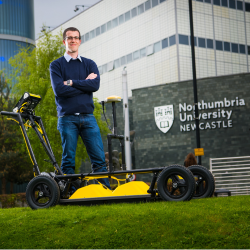-
Study
-
UCAS Clearing 2024
- Clearing Courses
- The Clearing Process
- UCAS Tariff Points
- Clearing 2024 FAQs
- Confirmation
- Clearing Virtual Event
-
Undergraduate
- Search for a Course
- Undergraduate Open Day & Events
- Application Guides
- Northumbria University UCAS Exhibitions
- Foundation Years
- Undergraduate Fees & Funding
- School & College Outreach
- Continuing Professional Development
-
Postgraduate
- Postgraduate Study Degree
- Postgraduate Research Degrees
- Postgraduate Open Days and Events
- Postgraduate Fees & Funding
- Flexible Learning
- Thinking about a Masters?
- Continuing Professional Development
- Change Direction
-
Student Life
- The Hub - Student Blog
- Accommodation
- Life in Newcastle
- Support for Students
- Careers
- Information for Parents
- Students' Union
- Northumbria Sport
-
-
International
International
Northumbria’s global footprint touches every continent across the world, through our global partnerships across 17 institutions in 10 countries, to our 277,000 strong alumni community and 150 recruitment partners – we prepare our students for the challenges of tomorrow. Discover more about how to join Northumbria’s global family or our partnerships.
View our Global Footprint-
Applying to Northumbria
- European Union
- Our London Campus
- Northumbria Pathway
- International Events
- Entry Requirements and Country Representatives
- Regional Offices
-
Northumbria Language Centre
- Faculty Requirements
- Acceptable English Requirements
- Pre-Sessional English and Study Skills
- Academic Language Skills Programmes (ALS)
-
International Fees, Funding & Scholarships
- International Undergraduate Fees
- International Undergraduate Funding
- International Masters Fees
- International Masters Funding
- International Postgraduate Research Fees
- International Postgraduate Research Funding
- International Money Matters
-
Life at Northumbria
- International student support
- Careers
-
International Mobility
- Current Northumbria Students
- Incoming Exchange Students
-
-
Business
Business
The world is changing faster than ever before. The future is there to be won by organisations who find ways to turn today's possibilities into tomorrows competitive edge. In a connected world, collaboration can be the key to success.
More on our Business Services -
Research
Research
Northumbria is a research-rich, business-focused, professional university with a global reputation for academic quality. We conduct ground-breaking research that is responsive to the science & technology, health & well being, economic and social and arts & cultural needs for the communities
Discover more about our Research -
About Us
-
About Northumbria
- Our Strategy
- Our Staff
- Place and Partnerships
- Student Profiles
- Alumni Profiles
- Leadership & Governance
- Academic Departments
- University Services
- History of Northumbria
- Contact us
- Online Shop
-
-
Alumni
Alumni
Northumbria University is renowned for the calibre of its business-ready graduates. Our alumni network has over 237,000 graduates based in 178 countries worldwide in a range of sectors, our alumni are making a real impact on the world.
Our Alumni - Work For Us
What will I learn on this module?
You will get the opportunity to improve and practice key numeracy skills that will enable you to complete the tasks for the other modules you are studying during the foundation year. These will include calculations associated with experimental work in chemistry, biology, biochemistry, biomedical science, food science, nutrition, forensic science and sport science, such as making solutions of different concentrations using solid chemicals, preparing dilutions using stock solutions, serial dilutions, making buffers, calculating rates of reaction, equilibrium constants, enthalpies, interpreting outcomes of antibiotic sensitivity testing, processing histological, physiological and biometrics measurements, calculating biodiversity indices, etc.
You will also review your IT skills to ensure you can easily access the eLP, library and other on-line resources, including guidance on correct referencing of scientific literature. You will use Microsoft Excel to process data similar to those that you will acquire experimentally in other modules, do simple statistics and produce graphical representations and tables of your data.
You will learn about the style of scientific writing used in peer-reviewed publications and how to present scientific data in different formats, eg. scientific report using the IMRAD style, short summary, poster, oral presentation, mini-literature review, essay. You will also learn how to find relevant and reliable sources of information and you will practice extracting relevant details from such sources and presenting them in your own words.
How will I learn on this module?
You will learn through lectures in which the key concepts will be discussed, with examples and demonstrations of software, and through workshops during which you will apply the key concepts to a variety of activities, eg. calculations, problem solving, design and evaluation of written materials. You will also be expected to engage in directed learning, using electronic resources produced or recommended by the module tutor, such as Panopto videos, YouTube videos and online quizzes with feedback, so that you can learn at your own pace and build confidence in your ability to transfer these skills to tasks for other modules and further studies.
How will I be supported academically on this module?
All lecture material will be available on the University eLearning Portal, supplemented with guidance on further reading relevant to the subject matter and links to other online resources. Electronic formative assessment with immediate score and feedback via the eLP and the supporting online resources, eg Panopto videos and help sheets, will represent important learning tools, to allow you to progress at your own pace and have guidance available all the time. Electronic feedback on summative assessments will be provided via the eLP to allow you to understand how you performed and how you can build on this performance in subsequent assessments in this module and across the programme.
What will I be expected to read on this module?
All modules at Northumbria include a range of reading materials that students are expected to engage with. The reading list for this module can be found at: http://readinglists.northumbria.ac.uk
(Reading List service online guide for academic staff this containing contact details for the Reading List team – http://library.northumbria.ac.uk/readinglists)
What will I be expected to achieve?
Knowledge & Understanding:
1. Quantitative methods associated with experimental work in chemistry, biology, biochemistry, biomedical science, food science and nutrition, sport science and forensic science;
2. The purpose and structure of different types of scientific communication;
Intellectual / Professional skills & abilities:
3. Transferrable numeracy and scientific communication skills;
4. Using Microsoft Excel for calculations, statistics and data presentation;
Personal Values Attributes (Global / Cultural awareness, Ethics, Curiosity) (PVA):
5. Confidence in your abilities as a scientist.
How will I be assessed?
CW1: Numeracy Skills Assessment – online test comprising of problem solving requiring calculations (50% of module mark; KU1, IPSA3-4; PVA5)
CW2: Scientific Communication Skills Assessment – online test comprising of a variety of tasks to test ability to retrieve, use and cite correctly scientific sources and ability to present information in different formats (50% of module mark; KU2, IPSA 3-4, PVA5).
Both components of assessment will be supported by formative online tests with immediate score and feedback. MLOs KU2, IPSA 3, IPSA 4 and PVA5.
Pre-requisite(s)
N/A
Co-requisite(s)
AP0307, AP0308 and AP0309
Module abstract
On completion of this module you will be able to demonstrate a range of numeracy skills that are essential for high standard performance in science subjects that involve practical laboratory and field work and require the production of informative scientific reports. These include calculations applied to solving problems in chemistry, biology, biochemistry, biomedical science, food science and nutrition, forensic science and sport science, as well as simple basic descriptive and hypothesis testing statistics. In addition you will have learned how to present scientific information in a variety of formats and how to use and reference appropriately scientific publications.
These skills will be invaluable for completing assessments for the other modules that are part of your foundation degree and for any progression degree you choose to follow at level 4.
Course info
UCAS Code Y002
Credits 20
Level of Study Undergraduate
Mode of Study 1 year Full Time followed by a further 3 years Full Time or 4 years with a placement (sandwich)/study abroad
Department Applied Sciences
Location City Campus, Northumbria University
City Newcastle
Start September 2024 or September 2025
All information is accurate at the time of sharing.
Full time Courses are primarily delivered via on-campus face to face learning but could include elements of online learning. Most courses run as planned and as promoted on our website and via our marketing materials, but if there are any substantial changes (as determined by the Competition and Markets Authority) to a course or there is the potential that course may be withdrawn, we will notify all affected applicants as soon as possible with advice and guidance regarding their options. It is also important to be aware that optional modules listed on course pages may be subject to change depending on uptake numbers each year.
Contact time is subject to increase or decrease in line with possible restrictions imposed by the government or the University in the interest of maintaining the health and safety and wellbeing of students, staff, and visitors if this is deemed necessary in future.
Useful Links
Find out about our distinctive approach at
www.northumbria.ac.uk/exp
Admissions Terms and Conditions
northumbria.ac.uk/terms
Fees and Funding
northumbria.ac.uk/fees
Admissions Policy
northumbria.ac.uk/adpolicy
Admissions Complaints Policy
northumbria.ac.uk/complaints














